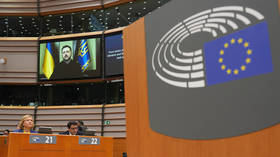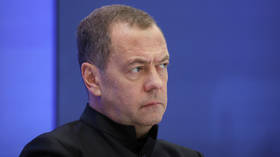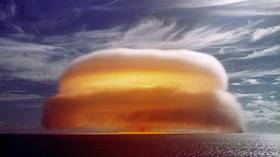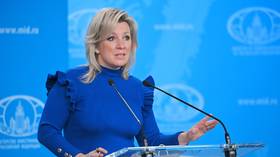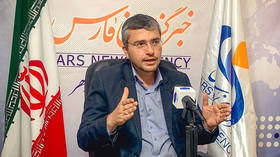‘Iran halted military nuke program for diplomacy’
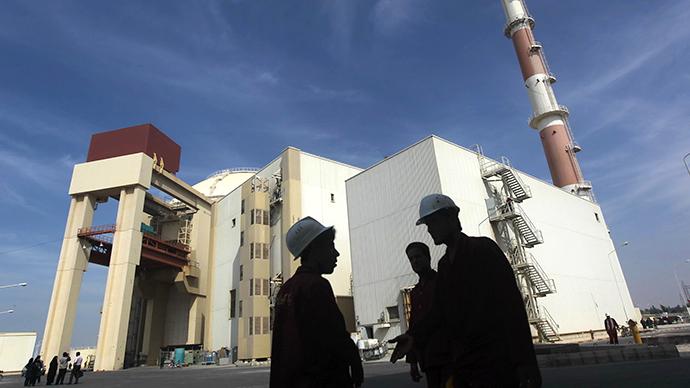
Iran halted its military nuclear plans due to diplomatic pressures when the US - posturing for war back in 2007 - claimed it was trying to develop a nuclear weapon, former chairman of the national intelligence council Thomas Fingar tells RT.
Iran and its nuclear program have been one of the top news stories in international media over the past year. Deep-seated tensions remain in the West, which suspects Tehran of developing atomic weapons.
RT discusses one of the key aspects of that conflict with Thomas Fingar, who oversaw a national intelligence estimate on Iran's nuclear program and back in 2007 told the US government that Iran pulled its plans to develop a nuclear weapon due to the “international scrutiny and pressure.”
He says no new information has come to light to overturn his 2007 estimate.
Now, Fingar argues the US is not in the mood for direct intervention.
“If I understand what President Obama is attempting to do, it is to scale back the US involvement, be less assertive in it”, he said. “The prevailing mood is if you try to help insiders conduct a revolution against obnoxious authoritarian incompetent regimes, you taint them. And you taint yourself.”
RT:If we could just start by talking about what happened back in 2007. You oversaw a national intelligence estimate on Iran's nuclear program. At the time your government was posturing for war, it was claiming that Iran was trying to develop a nuclear weapon. But your report effectively blew that out of the water. Was it difficult to get the truth out?
Thomas Fingar: The reality within the government was almost universally “This is really good work”. The focus was on the quality of the intelligence collection effort that had been successful and the quality and clarity of the analytic process and judgment. There were people outside of the government that did not like the conclusion; the implicit conclusion that diplomacy had worked. If diplomacy had worked, it might work again. The tactic they adopted was not to attack the substance - which they couldn’t do because they hadn’t seen it. It was classified, except for a summary. You couldn’t say it was as sloppy as the Iraq estimate. So it became an ad hominem: “These evil incompetent individuals, who opposed the president dashed this off with ulterior purposes”.
RT:So, given what you’ve said - is there scope for future whistleblowers - if I could call you that - for someone to come forward with an opinion that is different?
TF: There was no political blowback on me – not from within the government, from outside of the government. But members of Congress read newspapers affected by what their constituents read in the newspapers. Of course it is. But that’s also a part of the reality of living in a political environment.
RT:So, six years on – do you think Iran is still after a nuclear weapon in your opinion?
TF: The judgment that we made was that it was a political decision to halt the weaponization portions of its program and it continued the fissile material. The fissile material was the pacing element that the time required to go from the fissile material to a bomb. But they’d halted it – a terminology we used – because of the international scrutiny and pressure. But at the center it was a political decision. It wasn’t a matter of a technical problem or a change in geopolitical situation: they still lived in a tough neighborhood; they could turn this program back on again at any time. And we also said in that released part [of the report] we weren’t sure we would know if they turned it back on.
RT:And what about the intelligence? Is the intelligence good enough today to ascertain whether Iran actually does want to produce a nuclear weapon or whether it has started?
TF: I am outside of the government and the access to that, but the director of national intelligence must give an annual report to the Congress. It’s called the worldwide threat assessment – part of the budget process every year. There are both classified and unclassified versions of that report. And the unclassified versions of that report continue to reaffirm the judgments in the 2007 estimate. That leads me to judge after all the years of experience, that since they can’t say something different in public than they could say in a classified version, then either there is no adequate intelligence to reverse that judgment or the intelligence needs reaffirming. I don’t know which it is, but I know it comes out in the same place.
RT: Is the scope for this intelligence to be manipulated in any way, for example using the case of Iraq – it was claimed that it was trying to produce weapons of mass destruction – that proved not to be true. Is there a fear that future intelligence could be used a manipulated for a case against Iran?
TF: No. I really don’t. There were a lot of things wrong with that Iraq estimate. And my name was one of the ones on it. I was representing the bureau of intelligence and research. We were the dissenters on the nuclear portion of it. So there was no evidence of a reconstituted nuclear program, which was the only one that really mattered. But there were many problems in that estimate and the process has changed in the years since to fix that kind of a problem. There was not pressure there that led to any skewing. There was interpretation of what the intelligence said by politicians that went beyond what the intelligence community judgments were. For example the vice-president’s referring to the relationship between Saddam and Al-Qaeda. The intelligence community kept asking the CIA to look into this. And they kept saying there’s no evidence. No conclusive evidence. No persuasive evidence. And they asked many times. He didn’t say the intelligence community says there’s a link. He says the intelligence community has given me 13 reports on Saddam’s connection with Al-Qaeda.
RT:And when he says that how do you feel? Are you angry or frustrated?
TF: It’s not a prudent thing for politicians to do, because the intelligence community is presenting the same judgments to members of Congress. Members of Congress can ask “Do you agree with so and so?” And the answer would be ”I don’t know.” That’s not the judgment of the intelligence community.
So back to your original question – am I worried about politicization, about deliberate distortion? I am not. I think that the number of instances of political distortion of intelligence, intelligence community caving in to political pressure from people who have done this work… recent books by Paul Pillar and by Joshua Rovner – there are not very many examples in their multi-decade sweep. They’ve got basically the same examples. And if my memory of both books is correct, all of the examples are the director of Central Intelligence. Not lower level. It’s at that level a position that straddles the divide between analyst intelligence and policy makers. The members of the national security – they are supposed to be policy guys as well.
RT:Over the last 14 years we had we have seen to a large extent it becoming an age of US and NATO-led interventions from Yugoslavia through to Iraq, Libya and then Mali. Do you feel this sort of intervention is aiding the fight against terrorism?
TF: Mali, though a lot of it is depicted in counter-terrorist terms (you know the US and other supporters of the Malian army), I think if there’s any upsurge in terrorist activity directed at the West in general (because French, now US support it with air lift capacity), it’ll be pretty small.
RT: Given what you’ve said and the West’s reaction - “We are going to come and get you” – do you think we are now going to see more interventions in the future?
TF: I would doubt it. If I understand what President Obama is attempting to do, it is to scale back the US involvement, be less assertive in it. Other developed countries don’t have the military capacity. It’s a very much harder calculation. In a totally interconnected and transparent world, changes are going to come internally. I think that the prevailing mood is if you try to help insiders conduct a revolution against obnoxious authoritarian incompetent regimes, you taint them. And you taint yourself. You hope for the best. Sometimes you provide some assistance; you come in after they’ve got some modicum of success. That’s my sense of the way the wind is blowing, the trajectory of the world.
The statements, views and opinions expressed in this column are solely those of the author and do not necessarily represent those of RT.


